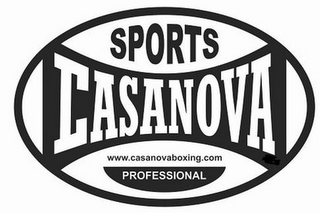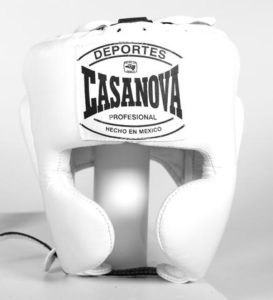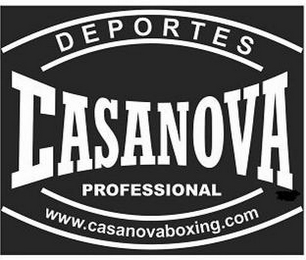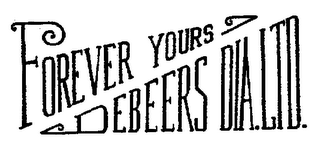Moreno v. Pro Boxing Supplies, Inc. is a precedential decision and, IMHO, clearly contrary to the Board’s controlling precedent.
Opposer and petitioner Julie Moreno is the exclusive US licensee of the unregistered trademark CASANOVA for boxing equipment:
Applicant and Registrant Pro Boxing Supplies is the owner of a registration for CASANOVA in standard character form and applications for CASANOVA in design form:

for goods and services related to boxing. Pro Boxing’s priority is no later than the constructive first use date for the first application, October 22, 2012, although the original application claims its use began in 1993.
The owner of the trademark licensed to Moreno is non-party Deportes Casanova, a Mexican company that owns a trademark registration in Mexico for the CASANOVA mark. Pro Boxing sold CASANOVA boxing gloves made in Mexico from 1987 or 1988 until 1990, which it purchased from a vendor. It then began to manufacture CASANOVA boxing gloves a few years later when the vendor said that the gloves he had been buying were no longer available.
Moreno claims that Deportes Casanova has had US rights in CASANOVA from as early as 1979, when Rocky Balboa wore them in the first Rocky film:
However, Moreno’s license from Deportes Casanova is dated 23 July 2013.
First up in any TTAB proceeding is standing. I applaud the TTAB on one standing challenge, frivolous in my view, which is Pro Boxing’s argument that because the license didn’t talk about quality control it was a naked license and Moreno therefore didn’t have standing. SHE IS A RESELLER: “we find the quality control and consideration aspects are inherent in this particular license agreement because Moreno is buying the licensed products from Deportes Casanova and simply re-selling them.”
The bar for standing is low and the Board concluded licensee Moreno had surmounted it, with a long string cite for those of you needing precedent to explain standing of a licensee.
But that was only part of the battle; the next step, in the Board’s view, was for Moreno to prove that she had priority over Pro Boxing. Framed this way, you spot the problem – Moreno’s rights arose only in 2013 when she became the Deportes Casanova exclusive licensee, a date after Pro Boxing’s rights arose. Desportes Casanova might have priority over Pro Boxing, but can Moreno rely on that priority in her own stead?
Although we have not had occasion to address this precise issue, we have encountered several cases in which a licensor and licensee were joint plaintiffs, and each was required to establish its own priority. For example, in Chicago Bears Football Club, the Chicago Bears Football Club owned a pleaded registration, and joint opposer NFL Properties was the licensing agent. Both opposers proved their priority, the Club via ownership of pleaded registrations properly made of record as well as evidence of sales, and NFL Properties via merchandise sales, and they jointly prevailed in their likelihood of confusion claim. The aforementioned Chemical New York case also involved two plaintiffs: an owner of the pleaded registrations, and a licensee who was unable to prove its own priority through use. The Board sustained the opposition based solely on the claim of the opposer who owned the pleaded registrations. Whether a licensee can assert priority based on use by the licensor of the licensed mark, as Moreno asserts, is an issue of first impression for the Board.
It is well-settled that use of a mark by a licensee inures to the benefit of the trademark owner. This is so because use of a mark by a related company inures to the benefit of the party who controls the nature and quality of the goods or services offered for sale in connection with the mark. Moreno has provided no authority for the converse principle, i.e., that use of a mark by the controlling trademark owner inures to the benefit of the licensee, and we are aware of none. Allowing a licensee to claim priority for itself in an inter partes proceeding based on the licensor’s use of the mark (whether through the license or otherwise), could result in a licensee being able to claim de facto ownership of the licensed mark. The license agreement, relied upon by Moreno and reproduced above, states that it gives Moreno “no ownership rights in the Intellectual Property [i.e., the marks] other than the license granted hereby.” Due to this express disavowal of any transfer to Moreno of ownership rights in CASANOVA, we cannot view the license as tantamount to an assignment of the mark, which might have allowed Moreno to assert whatever priority rights Deportes Casanova may have in the United States in the mark CASANOVA. We find that Moreno, a mere licensee, cannot rely on her licensor’s use to prove priority.
No, simply no. I understand that the Board relies on the litigants for their framing of the issue and relevant law, but it should also observe the controlling precedent whether or not the parties have located it. And there is precedent here on at least all 3 3/4’s with this case, Jewelers Vigilance Committee, Inc. v. Ullenberg.
There are two Jewelers Vigilance decisions by the Federal Circuit, one on standing and one on the merits, both reversing the Board. And it’s pretty much exactly the same fact pattern, except that the plaintiff, Jewelers Vigilance, was a trade association, where here the plaintiff is an exclusive licensee. In the first Jewelers Vigilance decision, the Board held that the trade association didn’t have standing to assert a claim that the registration of the mark “Forever Yours DeBeers Diamond Ltd.”
by defendant Ullenberg would cause the trade association harm on the basis that it was likely to be confused with the unregistered trademark DEBEERS owned by non-party DeBeers Consolidated Mines Limited and used by members of the trade association.
The Federal Circuit reversed the Board on standing:
The Board, in effect, by requiring JVC [Jewelers Vigilance] to possess a proprietary interest in the name DeBeers in order to have the requisite standing to bring an opposition proceeding under sections 2(a) or 2(d), confused a merits determination — whether Ullenberg is entitled to registration of its mark — with a standing determination — whether JVC has a right to bring the opposition proceeding.
…
There is no question that a trade association, having a real interest in the outcome of the proceedings, may maintain an opposition without proprietary rights in a mark or without asserting that it has a right or has an interest in using the alleged mark sought to be registered by an applicant. This is true irrespective of the grounds upon which the opposer relies in asserting the nonregistrability of applicant’s mark.
Jewelers Vigilance Comm., Inc. v. Ullenberg Corp., 823 F.2d 490, 492, 493 (Fed. Cir. 1987) (“Jewelers Vigilance I”).
On remand, the Board held that Jewelers Vigilance did not state a claim under Sections 2(a) or 2(d) of the Lanham Act because Jewelers Vigilance did not allege it had a proprietary interest in the mark. The Federal Circuit reversed and remanded again with instructions to grant summary judgment in favor of Jewelers Vigilance:
[T]he mandate of this court [in the first opinion] was intended as an express direction to the board to consider the parties’ evidence on the issue of false association and likelihood of confusion between Ullenberg’s and [DeBeers Consolidated Mines, Ltd.]’s respective uses of DEBEERS. Nevertheless, because the board is no doubt well aware that it has no option but to comply with the mandate of this court, we will assume the board somehow misunderstood that mandate and will proceed to address the basis for its holding, which appears to rest on a misapplication of Otto Roth to the facts of this case.
…
The Otto Roth analysis does mean that someone must have proprietary rights in the name DEBEERS, but such rights need not reside in the opposer if the opposer otherwise has standing to bring the opposition.
Jewelers Vigilance Comm., Inc. v. Ullenberg Corp., 853 F.2d 888, 892, 893 (Fed. Cir. 1988) (“Jewelers Vigilance II”).
The Board has misframed this case by describing it as a matter of Moreno’s priority. Moreno is not asserting her own rights; rather, she may and is asserting the rights of Deportes Casanova: “[P]ersons to whom Congress has granted a right of action, either expressly or by clear implication, may have standing to seek relief on the basis of the legal rights and interests of others, and, indeed, may invoke the general public interest in support of their claim.” Jewelers Vigilance I at 493.
So what’s up, Board? It held that Moreno had standing, but then made the same mistake it made in Jewelers Vigilance, holding that she had to own the proprietary rights too. That is plainly not true under both Jewelers Vigilance I and II. And if a trade association, with a more attenuated relationship to a mark than a licensee, doesn’t have to own the rights to succeed in an opposition, why should a licensee?
Moreno v. Pro Boxing Supplies is a precedental decision but one that looks pretty wrong to me. I would like to see the Board withdraw its opinion and ask the parties to brief the application of Jewelers Vigilance to the facts here.
Moreno v. Pro Boxing Supplies, Inc., Opp. Nos. 91214580, 91214877, Can. No. 92058878 (TTAB Sep. 8, 2017).
HT to John Welch for the case and for being my foil when thinking about it. You can read his summary here.

This work is licensed under a Creative Commons Attribution-NoDerivatives 4.0 International License.





Leave a Reply